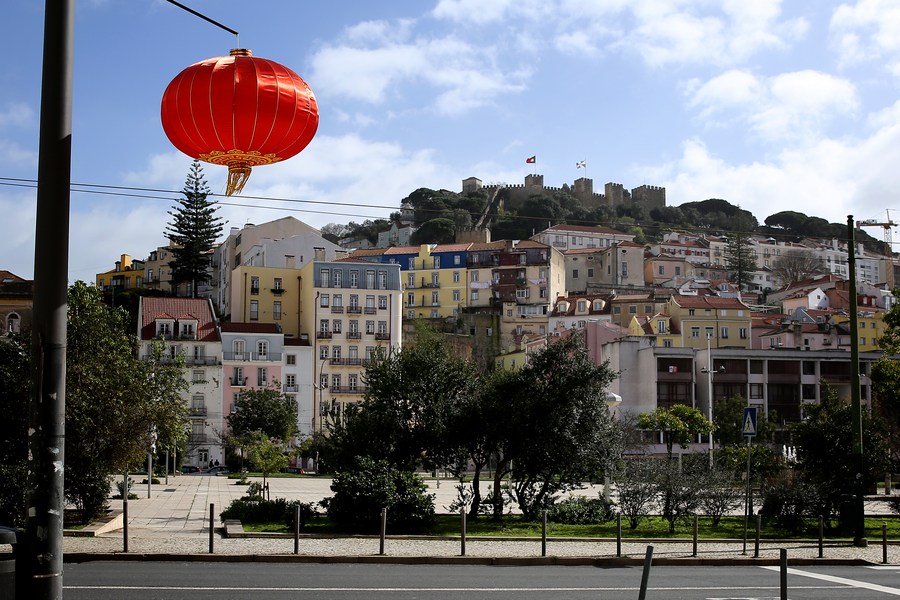Chinese language captivates Portuguese pensioner

A red lantern set for Chinese Lunar New Year is seen at Martin Moniz square in Lisbon, Portugal, on Feb. 12, 2021. (Photo by Pedro Fiuza/Xinhua)
Luis Raposo, a 74-year-old retired Portuguese jurist who now teaches Chinese at a local community college, said his explanations have aroused the interest of his students and inspired them to learn more about Chinese culture.
He said he was happy to have realized his dream by studying the Chinese language and becoming a Chinese language teacher in the first 10 years after his retirement.
LISBON, June 6 (Xinhua) -- Luis Raposo, a 74-year-old retired Portuguese jurist, has been fascinated with the characters used in the Chinese language since he started to learn Chinese at the University of Lisbon's Confucius Institute in 2009.
"My name means Huli (fox) in Chinese, and they call me 'fox'. In Portugal, the fox is a symbol of cleverness, and I like this name very much," he told Xinhua.
The written Chinese language is really interesting, he said. The Chinese characters have a logic of their own. Simple strokes are used to form them, and these characters in turn are used to form words and sentences, said Raposo, who joined the one-month summer camp organized by Tianjin Foreign Studies University in 2010 as the oldest student. "This (language) is very interesting, very ancient, (dating back) thousands of years. The unique charm of Chinese characters is fascinating."
He has familiarized himself with more than 2,000 Chinese characters over the years and has compiled a large database of his understanding and explanation of them.
Raposo, who now teaches Chinese at a local community college, said his explanations have aroused the interest of his students and inspired them to learn more about Chinese culture.
He said he was happy to have realized his dream by studying the Chinese language and becoming a Chinese language teacher in the first 10 years after his retirement.
His home resembles a showroom of Chinese culture: the walls are decorated with Chinese paper cuts and traditional face masks, Chinese knots are hanging on the pillars and hundreds of Chinese books are stacked on the shelves.
The Confucius Institute at the University of Lisbon awarded him the title of "honorary student" in 2018 in recognition of his passion for the Chinese language and his perseverance in learning Chinese characters.
Professor Teresa Cid, former Portuguese director of the Confucius Institute, praised Raposo as an intelligent student and a respectable teacher, whose devotion has helped several Portuguese people learn Chinese and understand Chinese culture.

People perform during a Chinese New Year celebration in Lisbon, Portugal, on Jan. 18, 2020. (Photo by Pedro Fiuza/Xinhua)
Wang Jincheng, Chinese director of the Confucius Institute who has also taught Chinese in Portugal, said he was moved by Raposo's enthusiasm and perseverance.
During his studies at the Confucius Institute, Raposo had often volunteered as a teaching assistant, explaining the meaning of Chinese characters to his fellow students and comparing notes with Chinese teachers after class.
"Huli's love for the Chinese language has become an inspiration for the people around him," Wang said.
Raposo's plan for the next decade is to publish a Portuguese-language dictionary of Chinese characters.
He said he hopes that the traditional Portuguese-Chinese friendship will last for generations to come and that he can continue to promote Chinese studies in Portugal through his knowledge and devotion.
Photos
Related Stories
- Chinese language competition held in Bulgaria for university students
- South Sudan's health workers start Chinese language lessons
- UN family in Ethiopia marks Chinese Language Day amid call for strong multilingualism
- Chinese envoy to UN encourages more people to use Chinese language
- China voices concern over Aussie state's decision to end Chinese language education program
Copyright © 2021 People's Daily Online. All Rights Reserved.










